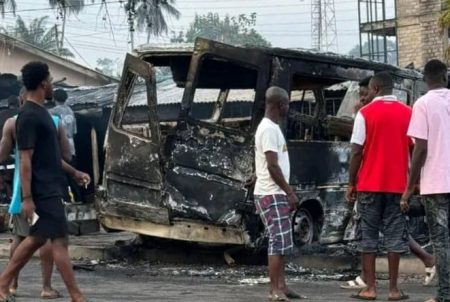The Ghana National Fire Service (GNFS) has emphasized the critical need for proactive fire safety measures in public spaces and commercial establishments. Assistant Divisional Officer Grade One (ADO1) Victor Gyan, the Bono East Public Relations Officer of the GNFS, stressed the mandatory installation of fire extinguishers, detectors, and alarms in markets, institutions, and private businesses. This call to action comes in the wake of a series of fire outbreaks across the country, underscoring the vulnerability of these locations and the potential for devastating consequences. ADO1 Gyan argued that these readily available fire suppression tools can significantly limit the spread of fires during the crucial early stages of an outbreak, thereby minimizing damage and potentially saving lives. He lamented the widespread lack of preparedness among business owners, highlighting the tendency to overlook safety measures until disaster strikes.
The recent fire outbreaks at the Techiman Central Market serve as a stark reminder of the devastating impact of inadequate fire safety protocols. Expressing sympathy for the victims, ADO1 Gyan urged their cooperation with the GNFS in conducting a thorough investigation to determine the extent of the damage and, crucially, the root causes of the incident. Understanding the origin of the fire, he emphasized, is paramount to preventing future occurrences. A rush to rebuild without a comprehensive understanding of the underlying issues would be imprudent and could lead to a repeat of the tragedy. A systematic analysis of the fire’s progression and the contributing factors is essential for developing effective preventive measures. Furthermore, a precise assessment of the damage is vital for any potential compensation efforts to support the affected traders.
Beyond the immediate response to the Techiman Market fires, ADO1 Gyan raised concerns regarding the structural layout of the market itself. He pointed out that the existing design hampered the fire service’s ability to access the scene promptly, hindering their efforts to contain the blaze. Improper layouts, characterized by narrow passageways, inadequate access points, and haphazard construction, can create significant obstacles for firefighters, increasing response times and allowing fires to spread rapidly. This highlights a broader issue of urban planning and the need for fire safety considerations to be integrated into market design and development. The inadequate layout not only jeopardizes the safety of traders and their goods but also puts the lives of firefighters at risk.
To address these critical safety concerns, ADO1 Gyan proposed the establishment of a dedicated fire post within the Techiman Central Market. This localized presence would ensure a swift response to any fire incidents, minimizing the crucial time lag between outbreak and intervention. Furthermore, he advocated for the installation of fire detectors and alarms throughout the market, forming an early warning system to alert occupants and emergency services at the first sign of fire. This multi-pronged approach, combining on-site personnel with advanced detection technology, would significantly enhance the market’s fire safety preparedness. The proposed measures aim to create a more resilient and secure environment, reducing the risk of future fire outbreaks and mitigating their impact.
The GNFS’s emphasis on proactive fire safety measures underscores a shift from reactive firefighting to preventative strategies. Installing fire extinguishers, detectors, and alarms represents a crucial first line of defense, empowering individuals and businesses to take immediate action in the event of a fire. These readily available tools can significantly reduce the spread of flames, potentially preventing small fires from escalating into major conflagrations. This approach also alleviates the burden on fire services, allowing them to focus on more complex incidents and community education. Furthermore, conducting thorough investigations after fire outbreaks is essential for identifying underlying causes and developing targeted prevention strategies. This data-driven approach can inform building codes, safety regulations, and public awareness campaigns, fostering a culture of fire safety.
In conclusion, the GNFS’s call for enhanced fire safety measures in public spaces and commercial establishments underscores a vital need for proactive risk management. The installation of fire extinguishers, detectors, and alarms, combined with improved market layouts and dedicated fire posts, represents a comprehensive approach to fire safety. This proactive strategy empowers individuals, businesses, and communities to take ownership of their safety, creating a more resilient and secure environment for all. By prioritizing fire prevention and investing in robust safety infrastructure, Ghana can significantly reduce the risk of devastating fire outbreaks and protect lives and livelihoods. The integration of fire safety considerations into urban planning and market design is crucial for long-term fire prevention.













